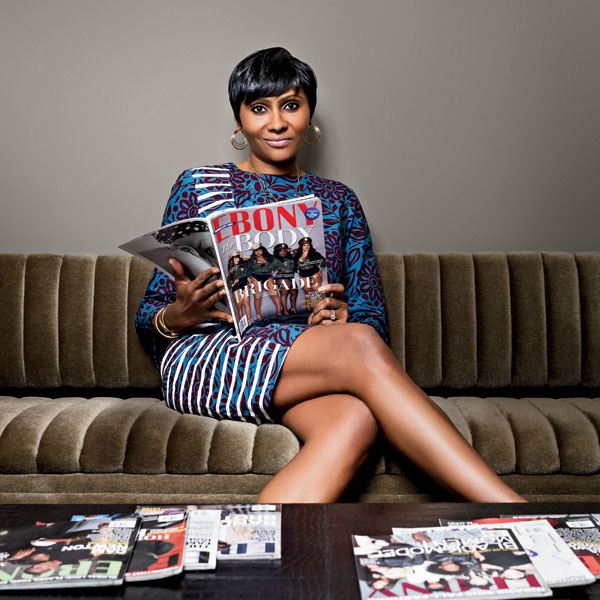
With all of the media chatter aimed at African Americans, is Ebony still needed?
Yes and no. From a media standpoint, you could say it’s not. There’s not going to be a single [media] source for any group ever again. But if you ask me as a black person, I believe it’s needed. Being able to recognize our history as a separate one and our story as specific to us is critically important.
Since you came in a year ago, the covers have been in-your-face. Why?
We needed to carve out a space that says we are essential to the conversation. There was a time when part of [Ebony’s] fundamental makeup was to be maverick. What we’re doing now is not really new. It’s just in a contemporary format.
Bill Cosby is still sacred in many corners of the black community. You put a picture of the Cosby family, with shattered glass, on the cover.
We understood that the allegations against Cosby represent a fracture in black America. Some of us feel passionately that he’s guilty and others that he’s being framed. [The cover] established that we are unafraid to jump in. What were we gonna do—sit and wait for Time to do it? No, we want to take on our own black family conversation.
What about the cover with the scantily clad, zaftig women?
Body image is perhaps the preeminent [issue black women deal with]. Every woman has this private conversation with herself. But it’s also public conversation because, whether you like it or not, you’re being judged. We all need the bravery these women tapped into. We all need to say, “You know what? This is what it is. Love me or leave me alone.”
How has your audience responded?
We drop a cover, and it feels like we broke the Internet. Even the pushback has been big, so it just tells me we’re in the conversation.
Some Noteworthy Mayo Covers

“The Family Issue(s),” November 2015
“The idea for the Cosby cover came from Tia Brown, our lifestyle director. The idea to fracture the glass, however, was something that happened after the then art director and I were challenging ourselves to figure out how to tell the story of what really happened with regard to the allegations against Cosby. We understood that the allegations against Cosby represent a fracture, in a macro sense, in black America. Some of us feel passionately that he’s incredibly guilty and others feel that he’s being framed. Ultimately, we were trying to poke and probe and ask very big questions. While it was off-putting to some people, I think what it did was establish that we are unafraid to jump into the conversation and take it head on. There’s no not talking about Cosby–even though for some he was the consummate representation of black success.”

“The Body Brigade,” March 2016
“Black women look like the women who were on this cover. Those women are not depicted in media in all of their authentic beauty, sexuality, glamour, power, badassness. All of that gets missed all day, every day. Those women [on the cover] were brave. That’s where the whole idea of them being soldiers came from, because we saw them truly as a front line. First of all, if you were willing to be half-dressed on the cover of a national magazine, and you’re not a size two, and you’re a woman, let alone a black one, you already are someone we want to hold up. We want to talk to you, we want to understand you, and we want to celebrate you.”

“White People Love Black Culture,” August 2015
“I’m really proud [of this cover]. We’re talking about appropriation in all kinds of spaces. Our artists are talking about it. Hollywood is talking about it. Hip-hop is talking about it. Everybody understands it is real, but nobody’s saying it. So again, I think Ebony needs to be in that conversation. And to know me as an editor, as my bosses do, is to know that I’m going to at least try to be a part of that conversation. And so, if I come to them on the right day, under the right moon, at the right time, then it all comes together.”


